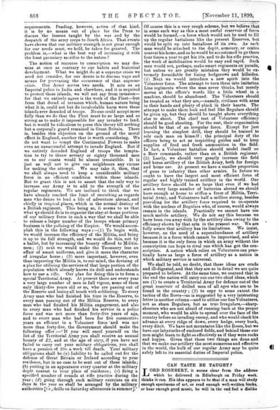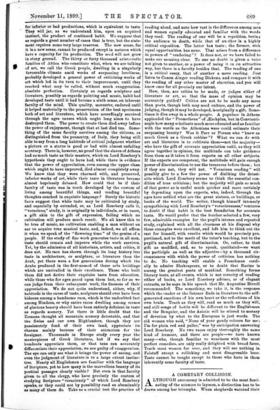CAN TASTE BE TAUGHT P I ORD ROSE BE RY, it
seems clear from the address 4 which he delivered in Edinburgh on Friday week, thinks it can. His idea appears to be that if a man will study enough specimens of art, or read enough well-written books, or hear enough good music, he will In the end feel a dislike
for inferior or bad productions, which is equivalent to taste. They will jar, as we understand him, upon an acquired instinct, the product of continued habit. We suppose that as regards a great number of cases that is true, but the state- ment requires some very large reserves. The new sense, for it is a new sense, cannot be produced except in natures which have a capacity for its production. The seed will not grow in stony ground. The thirty or forty thousand aristocratic families of Attica who constitute what, when we are talking of art, we call the Greek people, dwelling in a singularly favourable climate amid works of surpassing loveliness, probably developed a general power of criticising works of art which led in its turn to their improvement, until they reached what may be called, without much exaggeration.
absolute perfection. Certainly as regards sculpture and literature, possibly as regards painting and music, habit had developed taste until it had become a sixth sense, an inherent faculty of the mind. This quality, moreoter, endured until it helped materially to the preservation of the best specimens both of art and literature, which have accordingly survived through the ages causes which ought long since to have destroyed them. The power to create them died away before the power of enjoyment, though that at last died too. Some- thing of the same faculty survives among the citizens, as distinguished from the peasantry, of Italy, they being still able to say from a long habitude of critical judgment whether a picture, or a statue is good or bad with almost unfailing accuracy. There is, however, no proof that the slaves of Athens had asmuch taste as their masters, which on Lord Rosebery's hypothesis they ought to have had, while there is evidence that the power of appreciation, even among the upper class, which ought to have improved, died almost completely away. We know that they were charmed with, and preserved, inferior works of art, while their taste in literature became almost hopelessly debased. How could that be if their faculty of taste was in truth developed by the custom of living among beautiful things, and reading beautiful thoughts couched in exquisite language ? Surely the historic facts suggest that while taste may be cultivated by study, and especially by extended, or, as Lord Rosebery calls it, "voracious," study, it is originally in individuals, or in races, a gift akin to the gift of expression, failing which no cultivation will produce much result. We all know this to be true of music, no cultivation enabling a man without an ear to acquire true musical taste, and, indeed, we all affirm it when we speak of the "flowering time" of the genius of a people. If the study of fine work generates taste in all men, taste should remain and improve while the work survives. Yet, by the admission of all historians, artists, and critics, it does not. No race has shown through its long history less taste in architecture, or sculpture, or literature than the Arab, yet there were a few generations during which the Arabs produced in the first-named of those arts buildings which are unrivalled in their excellence. Those who built them did not derive their exquisite taste from education, while those who for ages gazed upon them lost, so far as we can judge from their subsequent wort, the fineness of their appreciation. We do not quite understand, either, why, if habitude is the cause of taste, sculpture should ever have been hideous among a handsome race, which is the undoubted fact among Hindoos, or why entire races dwelling among scenes of glorious beauty should have been entirely deficient in taste as regards scenery. Yet there is little doubt that the Romans thought all mountain scenery detestable, and that the Swiss and our own Highlanders, though they are passionately fond of their own land, appreciate its charms mainly because of their attraction for the foreigner. Thousands in Europe study every year the masterpieces of Greek literature, but if we say that hundreds- appreciate them, or that tens can accurately differentiate their appreciation, we are guilty of exaggeration. The eye can only see what it brings the power of seeing, and even the judgment of literature is to a large extent instinc- tive. Nearly all Englishmen are familiar with the language of Scripture, yet to how many is the marvellous beauty of its poetical passages clearly visible? Not even is that faculty given to all the clergy, who have precisely the custom of studying Scripture " voraciously " of which Lord Rosebery speaks, or they could not by possibility read so abominably as many of them do. Take as a crucial test the practice of
reading aloud, and note how vast is the difference among men and women equally educated and familiar with the words they read. The reading of one will be a repetition, horin4 the audience to death, while that of anther is a highly critical exposition. The latter has taste ; the former, with equal opportunities, has none. That arises from a difference in powers of " rendering "? It does not, or we have failed to make our meaning clear. To one no doubt is given a voice not given to another, or a power of using it in an attractive way, but there is a faculty besides that. The reading of one is a critical essay, that of another a mere reading. Jost listen to Canon Ainger reading Dickens, and compare it with the reading of any other master of elocution, and you will know once for all precisely our intent.
How, then, are critics to be made, or judges either of literature or art, so that the mass of opinion may be accurately guided ? Critics are not to be made any more than poets, though both may need culture, and the power of judging, though it may be developed, is originally a gift. Some- times it dies away in a whole people. A populace in Athens applauded the "Prometheus" of 2Eschylas, but in Constanti- nople how many scholiasts much more educated and as familiar with the words as the Athenians were could estimate their surpassing beauty ? Was it Parr or Porson who "knew as much Greek as a Greek cobbler "? What we can do with art and literature is to cultivate those—not the majority— who have the gift of accurate appreciation until, as they will agree together in opinion, the multitude can take guidance from them as it takes it from experts on all other subjects. If the experts are competent, the multitude will gain enough power of discrimination to use the treasures before them ; but if they are not, they will not. "Voracious reading" will possibly give to a few the power of disliking the detest- able which Lord Rosebery seems to think the essential con- dition of true criticism; but the majority will gain so much of that power as is useful much quicker and more certainly by depending upon the experts, who, indeed, through the ages have settled what are the great statues, or buildings, or books of the world. The writer, though himself intensely sympathising with Lord Rosebery's "voraciousness," ventures to doubt if that habit is the best foundation for accurate taste. He would prefer that the teacher selected a few, very few, admirable examples for the pupil's intense and repeated study, explained with all the clearness at his disposal why those examples were excellent, and left him to think out the rest for himself, with results which would be precisely pro. portioned, not to the merit of the tutor's teaching, but to the pupil's natural gift of discrimination. Or, rather, to that gift as modified, and, so to speak, qualitated—we want the participle as well as the adjective—by a thousand cir- cumstances with which the power of criticism has nothing to do. No teaching will enable a Frenchman cordi- ally to admire Shakespeare, or to doubt that Racine is among the greatest poets of mankind. Something forms literary taste, at all events, which is not voracity of reading either of books, as Lord Rosebery advises, or of elegant extracts, as he says in his speech that Mr. Augustine Birrell recommended. The something, we take it, is the response which the reader or the listener finds in literature to the self- generated emotions of his own heart or the reflections of his own brain. Teach as they will, read as much as they will, and still songs of battle will be different to the Englishman and the Bengalee, and the Asiatic will be stirred to ecstasy of devotion by what to the European is just words. The old woman who said, "None of your gaudy colours for me; I'm for plain red and yeller," was by anticipation answering Lord Rosebery. No two races enjoy thoroughly the same kind of humour, and there are people—we have known many—who, though familiar to weariness with the most perfect comedies, are only really delighted with broad farce. Teach most women for ever, and they will see nothing in Falstaff except a rollicking and most disagreeable boor. Taste cannot be taught except to those who have in them inherently some faculty of taste.











































 Previous page
Previous page